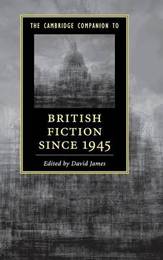
|
The Cambridge Companion to British Fiction since 1945
Hardback
Main Details
Description
This Companion offers a compelling engagement with British fiction from the end of the Second World War to the present day. Since 1945, British literature has served to mirror profound social, geopolitical and environmental change. Written by a host of leading scholars, this volume explores the myriad cultural movements and literary genres that have affected the development of postwar British fiction, showing how writers have given voice to matters of racial, regional and sexual identity. Covering subjects from immigration and ecology to science and globalism, this Companion draws on the latest critical innovations to provide insights into the traditions shaping the literary landscape of modern Britain, thus making it an essential resource for students and specialists alike.
Author Biography
David James is Reader in Modern and Contemporary Literature at Queen Mary, University of London. Author of Contemporary British Fiction and the Artistry of Space and Modernist Futures, his collaborative volumes on late twentieth- and twenty-first-century narrative include The Legacies of Modernism, Fiction since 2000: Postmillennial Commitments, and Andrea Levy: Contemporary Critical Perspectives.
Reviews'... The Cambridge Companion to British Fiction since 1945 offers an excellent critical introduction to the development of the novel in Britain since the Second World War, and James's careful organization and editing result in a wide-ranging and accessible collection.' Nick Bentley, The Review of English Studies 'The Cambridge Companion to British Fiction since 1945 offers an excellent critical introduction to the development of the novel in Britain since the Second World War, and James's careful organization and editing result in a wide-ranging and accessible collection. The book is ideal for selective dipping into, but what is striking for the reader that goes from start to finish is the productive overlaps with the reappearance of some writers in different chapters, such as Ishiguro, Rushdie, Swift and Winterson, like the return of recognized characters in an epic narrative.' Nick Bentley, University of Keele
|